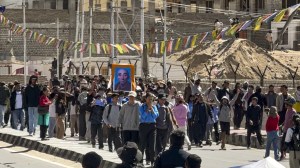Young steel for the frame
Two encouraging reports were the statement of government intentions that the age of entry to the twice born in the higher central services w...

Two encouraging reports were the statement of government intentions that the age of entry to the twice born in the higher central services will be 26 or 25 and not thirty plus as at present, and that empanelment for the joint secretary will be earlier and on merit, not just seniority. In the vernacular press in the city I live in, the lowering of age was reported as if the authorities were taking a benefit away. These proposals as the documents the administrative reforms department has put on net shows, are a couple of years old and were not acted upon by the NDA government on account of the flack they — wrongly in my opinion — were not willing to face, although they are of high intrinsic merit.
The argument used against the proposal to reduce the age of entry is that children from a poor or Scheduled Caste, Adivasi or OBC background will be at a disadvantage as compared to the westernised urban elite candidates. This is factually wrong and it is important to recognise this as the debate starts or the reform will be a non-starter in spite of its advantages to the country.
This was the major issue when the committee on reform of the higher civil services examination and training of the UPSC was working on the proposal. There is no question that the broad base of recruitment for the higher civil services, like the IAS or the Police, is a great advantage for India. Children coming from diverse social and economic backgrounds lend a truly national perspective and an empathy for the real problems of the country which candidates from an affluent or elite background alone would never give. But the plain fact of the matter was that candidates with college degrees from backward districts, disadvantaged communities and women, in fact started declining as a share of the total as the age limits for recruitment keep rising with the so-called objective of helping them.
The UPSC Committee tried to get at the reason. I asked the Zakir Hussain Centre for Education at JNU to conduct a study of the private cost of preparing for the exams. This was more than a lakh of rupees per year. A child from a poor family would simply not have the resources to keep on preparing for these exams, year after year, in terms of staying in the city and not doing an alternate job. So the children who largely benefit from this concession are those from the better-off within the communities that benefit from reservations. In other words, they are ‘second generation’ candidates from well-off families. Even this would be an advantage, had it not been for the fact that good candidates from the reserved communities from backward areas — the first generation ones — are available at younger ages.
As anyone who has conducted a large open competitive examination in this great country knows, it is richly endowed society with talent. At the top you get outstanding material and the difference between the highest ranks is very little. As a former vice-chancellor of Jawaharlal Nehru University, where tens of thousands of children apply, I know that at each point there are a number of candidates and the difference between them is very marginal. So really by reducing the age you still get very good material and — more important — from the really backward areas and communities. There, of course, the other advantages of catching them young. They are malleable, can be trained, imbued with a sense of mission, given technological skills and a sense of belonging to the super club, so that they perform collegially — which is the only reason we need an elite civil service. Entry has to be open but then they have to be the best and together. It is nonsense to say that we don’t get the best for the job. We do and the challenge is to keep them that way.
The civil service has to be honed into a force which supports India as it propels itself into a global powerhouse. They will have to be technologically savvy, but also sensitive to the rights of their compatriots and support civil society in the many ways that are needed to solve its problems. They will have to network, stand up for the rights of those ravaged by the powerful and the bazaar, and remain true to the ideals of those who freed this country and gave its poorest their rights. Men with smaller visions want the civil service to serve their smaller interests. That is why the second proposal to pick out the best after a couple of decades and trust them with the top is important and the government’s initiative needs full support.





- 01
- 02
- 03
- 04
- 05


























